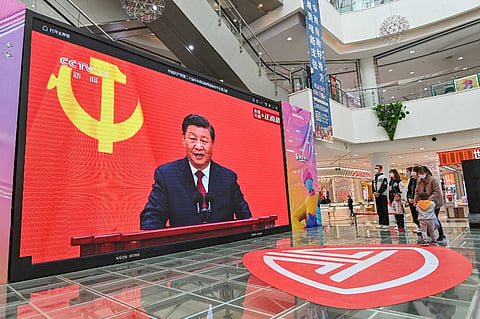
- NEWS
- the EDIT
- COMMENTARY
- BUSINESS
- LIFE
- SHOW
- ACTION
- GLOBAL GOALS
- SNAPS
- DYARYO TIRADA
- MORE

Chinese leader Xi Jinping has emerged from a five-year congress with even more power over the ruling Communist Party. AFP examines how Xi is expected to handle the key issues facing the country.
Slowing economy
China's slowing economy will likely dominate Xi's next five years in power, but his decision to pack the Communist Party's top leadership with loyalists has stoked concerns about him prioritizing ideology at the expense of growth.
After decades of high growth, China's economy is running out of steam, with analysts widely expecting the country will struggle to attain its 2022 growth target of around 5.5 percent.
And Xi's move suggests the days of liberal reformers steering the world's second largest economy have come to an end.
While past decades saw China's private sector grow rich on easy credit and hefty profits, Xi's next term may see Beijing revert to more old-school economic management, with a fresh focus on shoring up heavy industry and a continuation of a crackdown on big tech.
Xi has thrown his weight behind the development of a more consumption-driven economy — a policy known as "dual circulation" — and has sought to address China's yawning wealth gap under the banner of "common prosperity".
With the United States promising to prioritize maintaining "an enduring competitive edge" against China as the two superpowers battle for dominance over technology, Beijing may find itself under growing pressure internationally as growth slows at home.
Tensions over Taiwan
After years of ratcheting up tensions with Taiwan, an increasingly emboldened Xi could decide the time is right to fulfill Beijing's longstanding ambition of retaking the self-ruled democratic island.
US officials have argued that the world is closer than ever to seeing a conflict over the island — and that China could invade as soon as this year.
China has made a "fundamental decision that the status quo was no longer acceptable, and that Beijing was determined to pursue reunification on a much faster timeline," US Secretary of State Antony Blinken said this month.
Beijing insists its policy towards Taiwan has not changed, but the rhetoric and actions towards the island have become more pronounced.
The Communist Party for the first time enshrined its opposition to Taiwanese independence in its constitution at its just-ended congress which handed Xi a third term in power.
But any move to invade Taiwan would wreak havoc with global supply chains — the island is a major supply of semiconductors, an essential component of nearly all modern electronics, from smartphones to kitchen appliances and cars.
It would also provoke outrage from the West, deepening China's isolation, bring Beijing and Washington closer than ever to direct military confrontation, and snuff out Taiwan's hard-earned democratic freedoms.
Zero-Covid
Xi will also need to decide the future of China's strict zero-Covid policy — and whether the country is now ready to open up to the outside world after two years of closed borders and strict quarantines.
The policy is dragging on the economy, with officials this week blaming the epidemic for rising unemployment.
"Consumption is unlikely to recover to pre-Covid level with the current scale of Covid control," said Dan Wang, chief economist at Hang Seng Bank China.
And with Covid rules in China's semi-autonomous territory of Hong Kong slowly being relaxed in a bid to attract more international capital, Xi could decide the economic costs outweigh the benefits of keeping controls tight.
But the Chinese leader's speech to the party faithful last week gave no sign that the rigid policy — which has forced millions into lockdowns over just handfuls of cases as the rest of the world learns to live with the virus — would relent anytime soon.
And with the success of the zero-Covid policy so entwined with Xi's legitimacy, it appears unlikely that a relaxation will take place anytime soon — no matter the cost to the economy.
Human rights
China under Xi has seen the almost-total eradication of civil society, with scores of activists having fled the country and opposition to the government all but snuffed out.
And in the far-western region of Xinjiang, rights groups say more than a million Uyghurs and other Muslim minorities are detained in what the United States and lawmakers in Western countries have said amounts to genocide.
The situation looks unlikely to improve under the next five years as Xi's power grows increasingly impossible to challenge and the leadership digs in its heels against international pressure.
Xi's next term will likely see him "continue his profound assault on human rights across the country and around the globe," Sophie Richardson at Human Rights Watch wrote.
